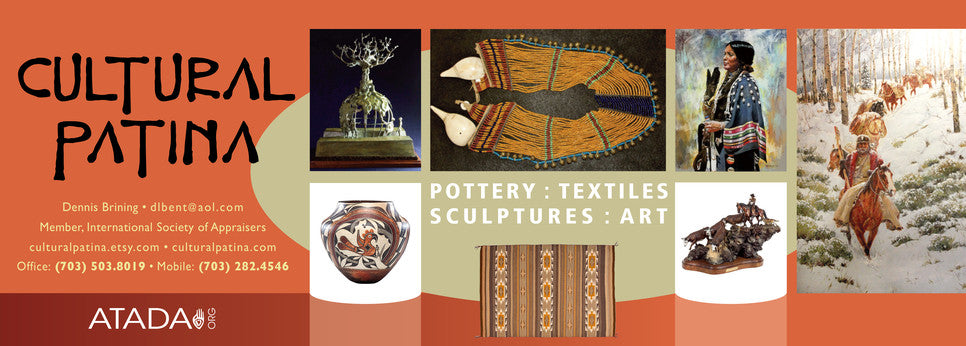
Cheyenne : After Frederic Remington, "Cheyenne" Bronze Sculpture #514 Sold Out
$ 1,695.00
Cheyenne
514. This is one of the finest reproductions of Remington's work and is in mint condition. The size 23" x 22". This is a genuine bronze sculpture created in the lost wax method and has a beautiful patina and sits on a fine Italian marble base. It is in mint condition. The Cheyenne is Remington's most popular Indian bronze sculpture. This piece has great movement and detail and terrific patina as noted in the snaps.
"Remington was one of the first artists to depict a galloping horse with all of its legs folded underneath as he showed with the Cheyenne using the buffalo cape to hold the horse up. He was influenced by a series of photographs by Edward Muybridge in "Animals In Motion" published in 1881. These photographs were the first to capture the galloping horse in mid-stride." The Cheyenne portrays a warrior galloping into battle on a horse in natural flight in mid-stride. This was a great accomplishment for Remington in grace and fluidity, he had made many prior attempts to portray a horse in natural flight. (Source: F&R Bronze)
It was cast in the US by the American Bronze Foundry and was part of the inventory of the now defunct American Heritage Gallery in Washington DC. Pieces were created using the time honored process of lost wax casting which remains essentially unchanged from the process employed centuries ago. Careful planning, painstaking preparation and hundreds of hours of intensive work is evident in each sculpture. Extraordinary details remains foremost as each piece receives a beautifully rich, hand polished patina or high gloss finish. Excellent condition. Ca late 1900's.
Frederic Remington (1861-1909): Depicted the life of the cowboy during the 1880's and 1890's better perhaps than any other artist of his time. He thought of himself as a true citizen of the American West.
A native of Canton, New York, Remington left college at the age of 19, looking for adventure in the West. Remington operated his own ranch in Kansas and in 1886 he gave it up as a failure and came back to the East. The experience served him well in his later career as an artist. "What success I have had", Remington once told a newspaper reporter, "has been because I have a horseman's knowledge of a horse. No one can draw equestrian subjects unless he is an equestrian himself".
As an artist, Remington first made a name for himself as an illustrator and painter, and began sculpting only 14 years before his death in 1909. "I was impelled to try my hand at sculpture by a mental desire to say something in the round as well as flat. Sculpture is the most perfect expression of action. You can say it all in clay." The first Remington in clay was "Bronco Buster", completed in 1895.
Among his admirers were Theodore Roosevelt, who once said that "Remington portrayed a most characteristic and yet vanishing type of American life. The soldier, the cowboy, the rancher, the Indian, the horses and cattle of the plains will live in his pictures and bronzes, I verily believe for all time". (Source: F&R Bronze)




